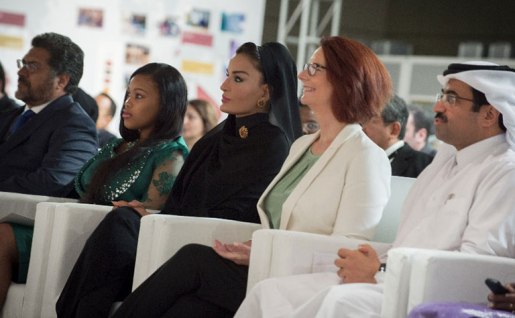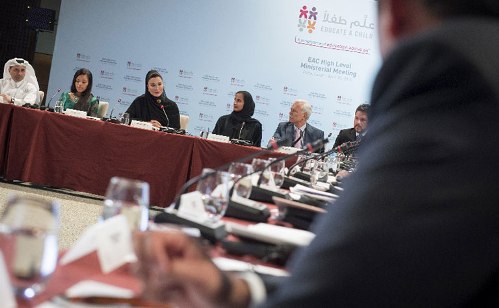La sheikha Mozah, présidente de la Qatar Foundation a assisté à l’ouverture de la deuxième session de Educate A Child (EAC) à Education City à Doha en présence de Ankusikata Fujian épouse du roi du Swaziland. EAC est un programme lancé à l’initiative de la sheikha Mozah dont le but est de réduire de façon significative le nombre d’enfants non scolarisés dans le monde.
Lancé il y a 18 mois le programme soutient actuellement 20 pays qui ont un taux d’analphabétisation important. EAC financé à 35 % par le Qatar et à 65 % par d’autres partenaires a pour ambition de permettre à 10 millions d’enfants d’accéder à l »Ecole primaire d’ici 2016. (Source : Qnaol – Merci à Guizmo)


3 mai 2014 @ 11:44
M’étant fait traiter de raciste aveugle, bornée et j’en passe… Si vous le permettez chère Régine, je demande un droit de réponse qui est est le suivant;
»
Qatar pressed to protect World Cup workers as deaths continue to rise
Gulf state urged to take action after official figures show migrant workers dying at rate of more than one a day
Share 358
inShare.9
Email
Owen Gibson
The Guardian, Thursday 1 May 2014 19.48 BST
Jump to comments (94)
Migrant workers leave a construction site in Doha, Qatar
Migrant workers leave a construction site in Doha, Qatar, where 1.4 million labourers are helping prepare for the 2022 World Cup. Photograph: EPA
Migrant workers are still dying in Qatar at a rate of more than one a day, intensifying pressure on the Gulf state to improve conditions for the 1.4 million labourers helping it prepare for 2022 World Cup.
On the day that the Qatari authorities confirmed they had received a pivotal independent report into workers’ rights triggered by Guardian revelations of workplace abuses in the country, they on Thursday faced mounting calls to rapidly reform labour laws.
According to official figures, a total of 53 Nepalese workers died between January 2014 and mid-April this year, taking the toll on that country since January 2012 to more than 430. New figures from the Indian embassy show that 89 migrants died in the first four months of the year, bringing the total of Indian deaths to 567 since January 2012.
Analysis of previous death figures has shown that a high proportion were involved in workplace accidents or suffered sudden heart failure, though some may have died of natural causes and will not have been on building sites.
Qatari officials have stepped up inspections of working conditions and recently gave strong indications that they are prepared to reform labour laws, but it remains unclear whether they will go as far as scrapping an exit-visa system which prevents workers leaving Qatar without the permission of their employer. There are many examples of migrant workers being effectively held to ransom because their employer refuses to allow them to leave, with French footballer Zahir Belounis being a high-profile example.
The exit-visa system has become an important issue as rights bodies await the publication of an independent report by law firm DLA Piper that was commissioned in the wake of a global outcry prompted by a series of reports in the Guardian in September 2013.
The Qatari government confirmed they had received the « comprehensive » DLA Piper report into the health and safety migrant workers and its national labour laws. It said it was studying the conclusions and proposals for action, promising to publish it in full at a later date together with its response.
At a conference in Doha on Thursday attended by senior Qatari government representatives, Amnesty International’s head of global issues, Audrey Gaughran, told them the exit-visa system was a « blatant human rights violation ».
Human rights organisations believe Qatar has reached a crunch point at which it must make a decisive move to demonstrate its commitment to reform by scrapping exit visas.
« It would be evidence of good intentions and good faith. It’s very much the low-hanging fruit in this debate. [The system] can be abolished without any impact on the profitability of commercial enterprises, » said Nicholas McGeehan, the Human Rights Watch researcher for Bahrain, Qatar, and United Arab Emirates.
« We recognise that labour reform will be incremental. We see it as in Qatar’s best interests to get rid of this system. It would demonstrate to the business community that labour reform and the ability to run commercial enterprises are not mutually exclusive. We hope someone invests some political capital in this and abolishes it. »
The minister of labour and social affairs, Abdullah Saleh Mubarak Al Khulaifi, told the Peninsula newspaper his ministry was making « every effort » to tackle all laws that relate to workers’ issues. He reportedly announced a new system whereby workers would have to be paid by bank transfers, which can be monitored, instead of by cash, which is open to abuse.
« Our [Islamic] religion has ordered us to treat workers in a humane way, and not to task them with unbearable jobs … most importantly, to pay them, » Khulaifi said. « We hope that the wage protection system will achieve its aims. »
James Lynch, Amnesty’s lead researcher for the Middle East, said after speaking at Thursday’s conference that the Qataris were engaging with the complex issue but Amnesty now wanted to see concrete signs of progress.
« It is encouraging that the government turned out in force and the officials with relevant authority engaged in the debate, » said Lynch.
« But we don’t have any new information about what the plans are. There was some acknowledgement that there were issues to be addressed, but we didn’t hear any positions particularly shifting. »
Workers from Nepal make up around a sixth of the 1.4 million migrant workers in Qatar fuelling a £123bn investment in infrastructure over the next four years, while just over a fifth come from India.
The oil and gas-rich Gulf state is embarking on an unprecedented « nation-building programme » of which the 2022 World Cup is an integral part. The International Trade Union Confederation has warned that 4,000 migrant workers could die before a ball is kicked if nothing is done to reform labour laws.
Pressure for better working conditions has increased since a Guardian investigation last year discovered that Nepali workers alone died at a rate of almost one a day last summer. The new figures from the Nepalese Foreign Employment Promotion Board are likely to be a conservative estimate, because they only record those families that approach it for compensation on behalf of the deceased.
Qatar has its UN universal periodic review session on 7 May – a process that takes place every four years in which a country’s human rights record is reviewed by other states – and is expected to want to unveil some progress towards labour law reform before then.
Visiting MEPs and other inspectors have also been told to expect significant changes to the labour law, which could include a commitment to extend a new workers’ charter applying to World Cup-related projects to all work commissioned by the government.
Jim Murphy, the shadow secretary for international development, said: « The release of the DLA Piper report will be a step in the right direction, but the real test is the reform that comes with it. Fifa must insist on substantial change that dramatically improves the lot of migrant workers currently suffering in Qatar. »
L’organisation de la Coupe du Monde de football au Qatar, en 2022, continue de provoquer l’indignation en Angleterre – rappelons que le pays de naissance du football rêvait d’organiser l’épreuve. En cause cette fois-ci, la mortalité importante qui sévit sur les chantiers de construction des stades. Selon «The Guardian», 53 Népalais et 89 Indiens y ont trouvé la mort depuis le début de l’année. Les autorités qataris ont promis d’examiner les conditions de travail des ouvriers, face à la montée des protestations.
4 mai 2014 @ 18:05
@Qiou : vos infos sont bien utiles à avoir.Merci.
3 mai 2014 @ 16:26
Je me demande quel est le numero de l’epouse du roi du Swaziland, il en prend une nouvelle chaque annee a la Reed dance, je dois dire que 2 se sont deja enfuies.
4 mai 2014 @ 11:45
????????!!
4 mai 2014 @ 01:36
J’aime beaucoup l’air doux et rassurant de la Sheika et je l’imagine bien en tenue kaki offrant des armes aux salafistes pacifiques et non guerriers.
4 mai 2014 @ 07:25
Tous ces enfants scolarisés finiront par lui demander des comptes.
4 mai 2014 @ 11:50
Vous êtes un doux rêveur….
4 mai 2014 @ 08:08
Je crois avoir reconnu la dame souriante à coté de la sheikha Mozah,est-elle australienne?
N’y-a-t-il plus d’enfants analphabètes au Qatar?